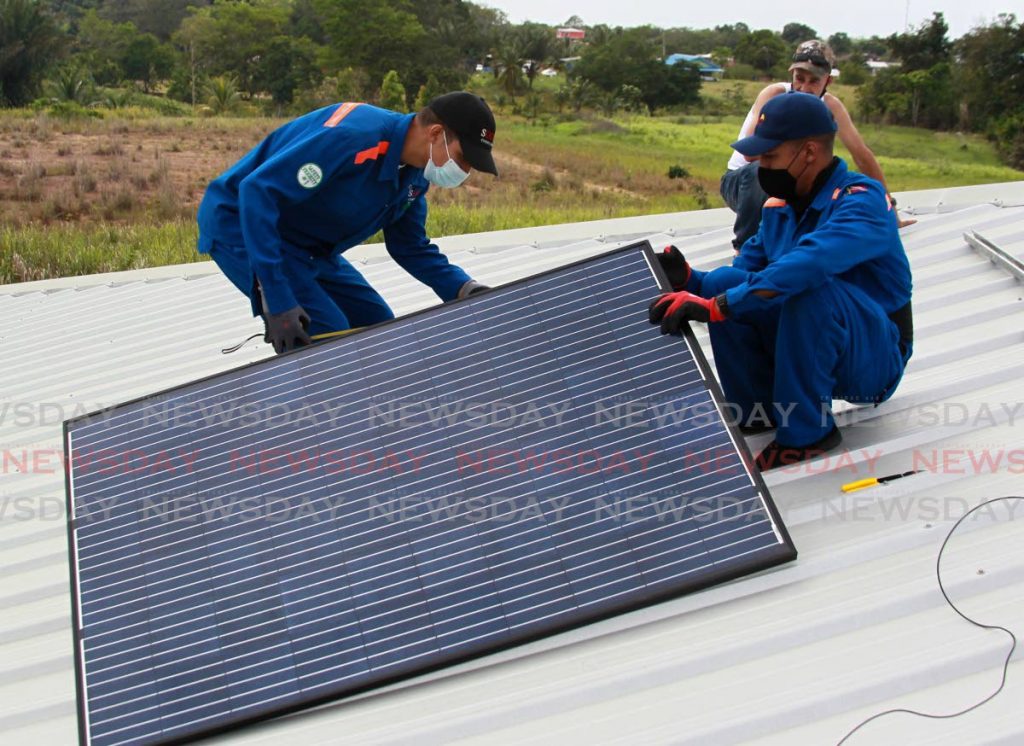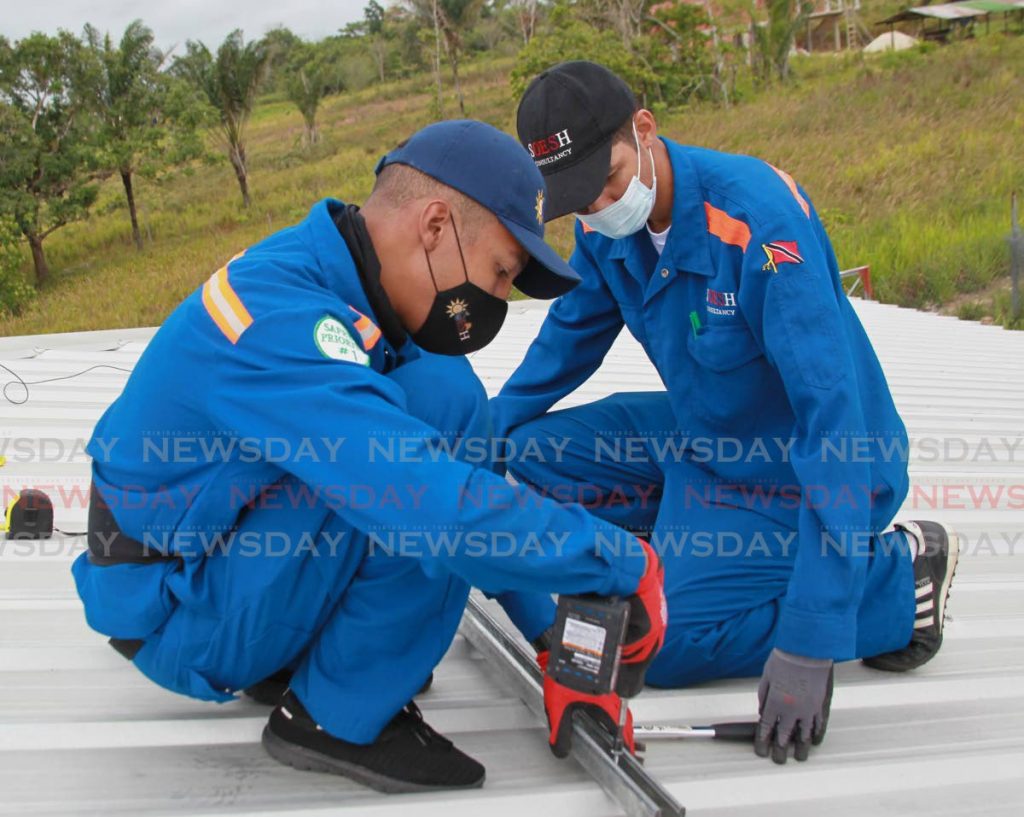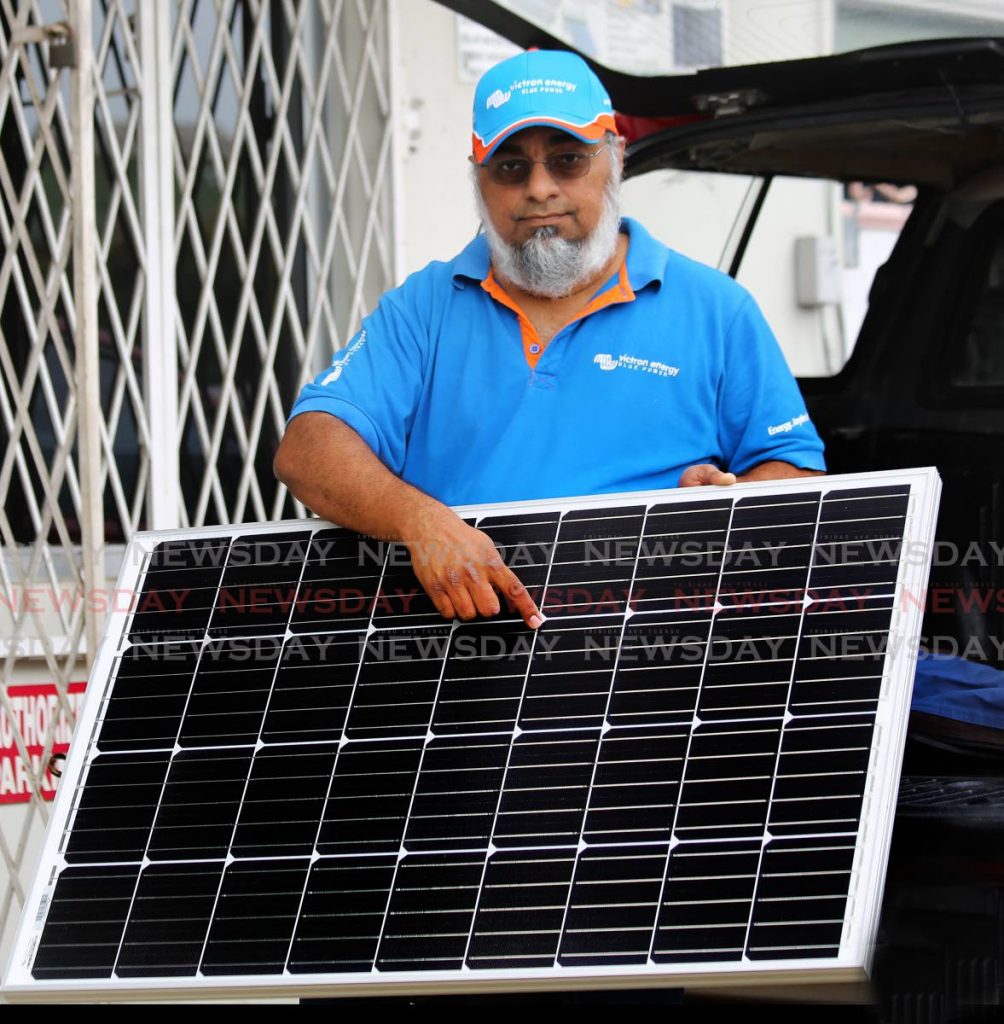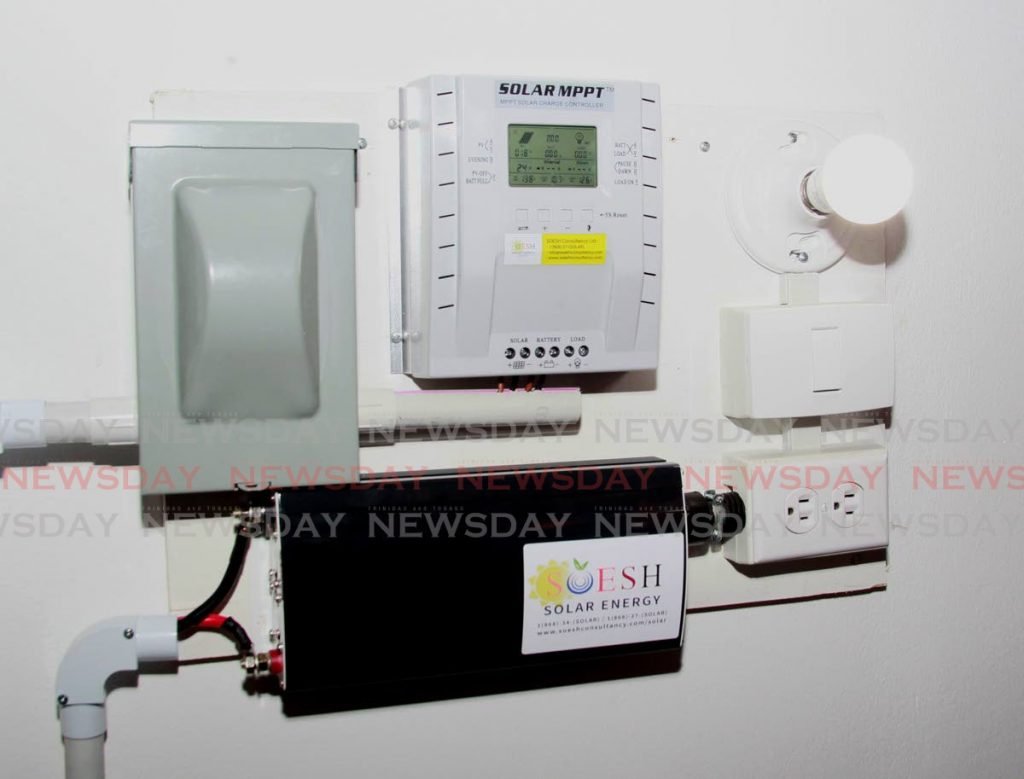Solar power companies help households save energy

Goal number seven, of the United Nations’s 17 sustainable development goals, is to ensure there is universal access to affordable, reliable, and modern energy services by 2030.
To achieve this goal, the UN is promoting the use of affordable and clean energy with solar power being a desired alternative energy cost.
In an effort to help TT achieve the UN’s clean energy targets by 2030, parliament ratified the International Solar Alliance (ISA) framework agreement last year.
Under the framework, and with the support of the EU and the United Nations Development Programme, this country will aim to install solar panels in communities across the country.
Part of this effort is being funded by the European Union’s Global Climate Change Alliance Plus to the tune of $19 million.
But apart from nationally funded solar projects, domestic households in TT are also getting in on the action and installing solar panels in a bid to diversify their energy sources by using alternative energy.
To get a behind-the-scenes look of TT’s solar industry, Business Day recently spoke to Sion Faria and Haroon Soobrattee.

-
With a master’s in environmental safety and health, Faria founded the Solar Occupational Environmental Safety and Health Company (SOESH) in 2015. He also has certifications in photovoltaic solar energy and renewable energy and has done specialised courses in energy production, distribution, and safety. Faria founded SOESH after what he considered to be a gap in TT’s solar energy industry.
An electrical engineer, Soobrattee founded green energy company Renewable Energy Solutions in 2006. In 2011, Soobrattee’s company launched a subset of the international solarworld brand in TT. Solarworld is an international solar power company based in Germany.
Sourcing Solar Panels
Monocrystalline and polycrystalline solar panels are the two most widely used types of solar panels.
“The main difference is in the manufacturing process. Monocrystalline panels are manufactured under more cutting-edge technology, so the efficiency is a bit higher and hence it is more expensive,” said Faria.
Currently, in TT, there are no manufactures of the two types of panels. Local solar power companies therefore import ready-made panels.
Faria's company, SOESH, installs both monocrystalline and polycrystalline panels, which he sources from manufacturers in the US, Germany and China. In what he sees as an incentive, Faria said he does not have to pay duties on solar panel imports.
Soobrattee also uses both types of panels but mainly imports his panels from Asian countries like Malaysia, South Korea, Vietnam and China. He also imports from Mexico.

Both men agree it would not be feasible to manufacture solar panels in TT.
Faria explained: “Even though it’s doable (manufacturing solar panels in TT), it’s way more cost effective to import the panels unfortunately because TT is not home to any of the rare earth metals that are required in solar panel systems. So, it’s more economically feasible to import the panels,” said Faria. Silicon and lithium are the main rare earth metals needed to produce solar panels.
While silicon is a common earth metal which can be found in abundance anywhere, Faria said TT currently doesn’t have the capabilities to mine the metal.
Even if a local manufacturer develops effective silicon mining capabilities and can secure a consistent supply of lithium, Soobrattee sees the need for strict quality control standards and questions if solar panel production in TT will be financially viable.
“The quality of the solar panels we import are from manufacturers who (have been) manufacturing for a long time. Even if, for example, in TT we wanted to manufacture solar panels…quality control would be very important. Most of the times these panels are manufactured in facilities where no one touches them until they come off an assembly line.
“Also, the quantities that are manufactured by some of these (international) facilities... we don’t have a market locally for that kind of quantity,” said Soobrattee.
Installing Solar Panels
Faria said customers don't need special permission from the TT Electricity Commission (TTEC) to install a solar panel system once the system is fully off grid. The system would need to be installed with its own breaker, wiring and plug systems.

-
Still, Faria said, it is proper protocol to follow the national guidelines on electrical wiring systems when installing solar systems.
Since launching solarworld-tt, Soobrattee has done installations for a mix of corporate and domestic clients.
Regardless of the client, Soobrattee said the same solar panels are used. The main difference between commercial and domestic instillations is the number of solar panels used.
“Solar power is something that is very expandable. You can start with a very small solar panel and just have one to do... simple lighting, or you can do hundreds of solar panels to power an industry.
Cost of installing solar panels
The cost of installing a solar panel system depends on the scale of the installation.
For example, Soobrattee said domestic installations can start from as little as $1,500 and move upwards to $20,000. For $1,500, customers can get a panel which provides energy for a small number of lights and even charge their cellphones.
Large scale installation for commercial purposes can move upwards of $100,000 according to Faria.
Once installed, solar panels can have a lifetime of up to 25 years once they are of good quality and properly maintained. But panels can even longer than that: Faria said he has spoken to someone with a panel that was bought in and has been operating since 1988.
When it comes to maintenance, Soobrattee said solar panels require little and is something the homeowner or a general electrician can handle. General maintenance of panels includes checking the electrical connections or cleaning the panels if they get dirty.
“I like to have my customers participate in the instillation to help with their understanding of the solar panels. We also appreciate if the customer has some background knowledge, and many do. In some cases, we supply the components, and they install it themselves," Soobrattee said.
“We prefer this because if these is any trouble or troubleshooting...and the customer lives in a remote area, they can handle most of the problems themselves.”
Faria said SOESH offers a 25-year warranty. In additional to the main solar panels, Faria said components of a solar panel system like the inverters and batteries are also warrantied. These smaller components can have warranties ranging from two to five years.
“Those (smaller) parts, because they are electrical and mechanical parts, have a bit more logistics when it comes to maintenance. That is why those parts will have shorter warranties.
“The higher you go, in terms of the more solar power you want to run your house on, it would require more maintenance because there are more wires, connections and safety precautions in place.
“In that case, every six months, I would offer a package where a homeowner can have one of my workers inspect and even maintain the systems,” said Faria.
Future of solar power in TT
Both men agree that while people are embracing solar power more needs to be done to encourage and incentive people to adopt the technology.
Soobrattee said people are installing solar systems as a backup in the event of power loss, especially given that more people are working from home, due to covid19, with a heavy reliance on technological devices. He said this hybrid approach is the beginning of a larger transition to solar power.

“On a daily basis, I get at least ten people calling who live in areas where they do not have a TTEC supply. Most of these are small families and they don’t have access to power. Some may be squatters of farmers and no one is assisting them in terms of getting power.
“A lot of my market is also in Tobago; I visit Tobago at least once every month,” said Soobrattee.
If there is an increase in TT’s electricity rates, which are already among some of the lowest in the world, Soobrattee thinks this will drive more people to use solar power.
Faria said he has seen an uptick in customers since the start of the covid19 pandemic.
He attributes the increase to more people working at home and seeing an increase in their electricity rates due to an increase in electricity use.
“As more people are at home now, they are realising their electricity is raising due to increased power uses. This has given them more incentive to go in the way of solar,” said Faria.
But even with an increase in electricity bills due to increased usage, Faria noted TT’s electricity rates are still among the lowest in the world, which he said is a hindrance to people fully embracing solar power.
In the 2020 budget presentation, it was proposed to increase the solar water heating equipment tax credit from 25 to 100 percent of the cost of the equipment up to a maximum of $10,000.
Faria is calling for more to be done.
He said while tax incentives are great, he hoped TT can adopt a system where people using solar power are able to feed their surplus power back into the grid and receive financial incentives for doing so.
Faria wanted people to see the benefits of using solar power even if they are on the grid.
“You would have a separate grid in your house (with solar power) that will always have electricity. Whether TTEC is down of anything happens like a storm or rain, and it knocks down the power line, you will always have that one grid in your house where you can charge your phone, watch TV, put on your lights and other small stuff.
“Even if you aren’t doing it (solar power) for savings, you are doing it for a safety reason.”

Comments
"Solar power companies help households save energy"